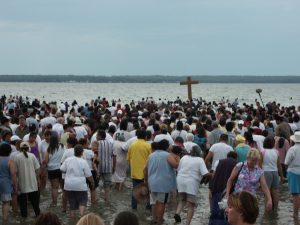HOMILY WEEK 16 01 – Year II
Pilgrims of the Heart
(Micah 6:1-4; 6-8; Ps 50; Ps 50; Mt 12:38-42)
***********************************************
There are two foci in the readings today: the infidelity of Israel, and the unconditional love of God calling them back.
The infidelity is expressed in interesting ways: they have created a controversy with God; they hate discipline and cast the Words of God behind their backs; they offer insincere sacrifices to God; they have become an evil and adulterous generation, and most of all, they suffer from “self-will run riot” as the AA program expresses it.
The unconditional love of God comes across as a plea from a broken-heart; a desire for a more intimate relationship; a call to repentance, faith in Jesus our Lord, and ultimately, justice, love and humility. The reading from Micah puts it well: act justly, love tenderly and walk humbly with God.

Blessing of the Lake
This is the season of pilgrimages. The thousands of pilgrims flocking to Lac St Anne each year (except this year when it will be a virtual pre-recorded pilgrimage due to the pandemic), are an example of those who are coming back to a closer relationship with God. The whole idea of a pilgrimage is a desire for a theophany – an encounter with God. Pilgrims leave the comfort of home and travel to where two realities meet – earth and sky, or earth and water – itself a gesture for a theophany.
For a priest or bishop, part of the richness of the pilgrimage experience is spending time in the octagonal structure tucked in behind the shrine in which are found numerous rooms for the sacrament of Reconciliation. Something about the pilgrimage encourages thousands of pilgrims to go deep, to open up, deal with the past, admit their most grievous sins and seek to be reconciled and healed. Words cannot describe what that experience of journeying with others into greater freedom, joy and peace is like. I can only marvel at the awesome, delicate yet profound way the Spirit of the Risen Lord works in the lives of the pilgrims.
I remember one penitent who was so traumatized by her shameful past she could only whisper when she came in. Little by little, she was able to open up, share her burden and receive both forgiveness and healing. When she learned God would not only forgive her sins, but even forget them (“As far as the East is from the West I will cast your sins … I will deal with your iniquity and not even remember it”) – that when God forgets, those sins no longer even exist – she found new life and her voice. She went away liberated and full of joy. How does one measure that?
The Eucharist is also a theophany – in a way, a pilgrimage into a deeper relationship with God. We come together to journey through God’s word, repentant and open and recognize Jesus in the breaking of the Bread.
May our celebration make us true pilgrims of the heart, and lead us to act justly, love tenderly and walk humbly with our God.



